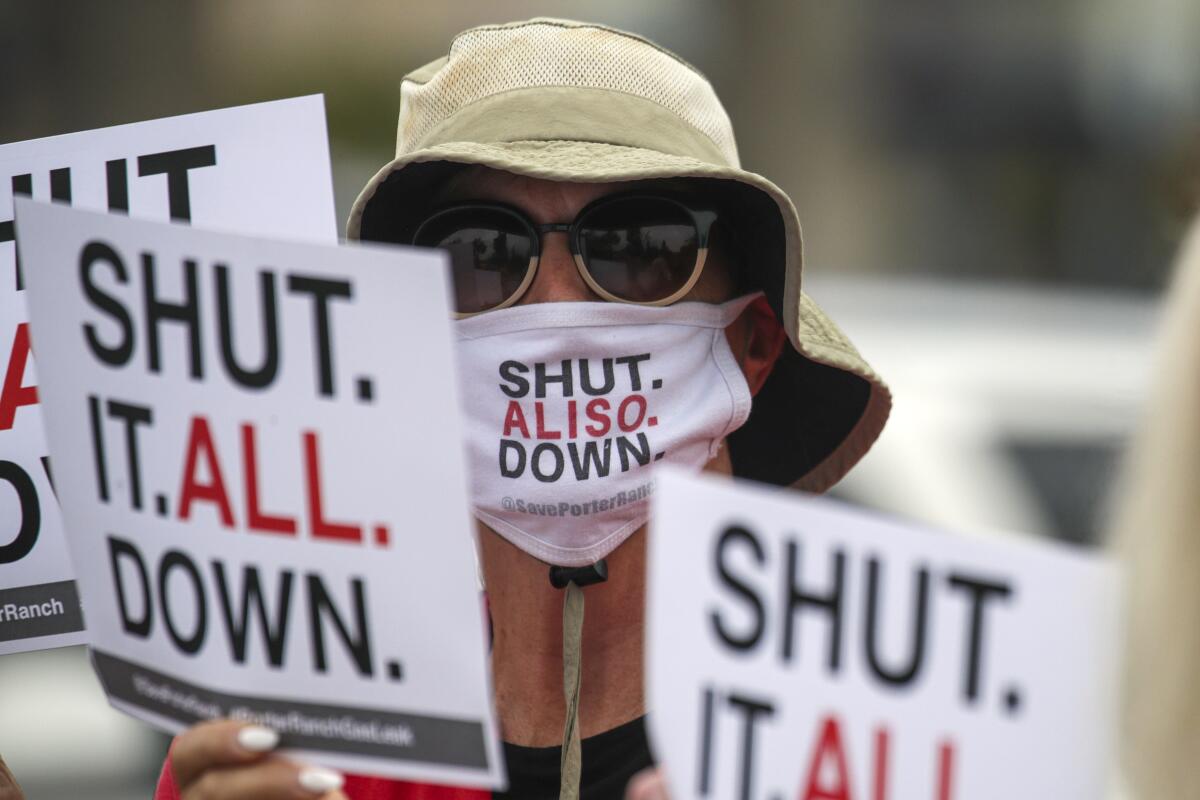L.A. County calls for independent health study of massive natural gas leak in Aliso Canyon

- Share via
Los Angeles County health officials are calling for an independent study into the short- and long-term health effects on residents near the San Fernando Valley’s Aliso Canyon, which in 2015 was the site of the largest natural gas blowout in U.S. history.
The county Department of Public Health’s request for proposals, announced Tuesday, seeks third-party researchers to lead the Aliso Canyon Disaster Health Research Study, officials said.
“We are committed to selecting an independent research group with the broad but also highly specialized expertise needed to shed further light on the health impacts of this catastrophic environmental disaster,” said Dr. Paul Simon, the department’s chief science officer.
The announcement was a long time coming for residents of the Porter Ranch community, which was most affected by the massive October 2015 leak from Southern California Gas Co.’s Aliso Canyon natural gas storage facility in the Santa Susana Mountains. The leak lasted 111 days and released more than 109,000 metric tons of methane — a potent greenhouse gas — and other chemicals into the area.
A $1.8-billion settlement over the 2015 gas leak has relieved some residents, but many still seek answers about the consequences to their health.
The impact was felt immediately. People living and working nearby suffered nausea, nosebleeds, skin rashes and breathing problems, and thousands of families had to evacuate their homes. As the leak wore on, video captured by an infrared camera showed clouds of oily gas blanketing the area.
Yet many residents have waited years for clearer information about what, specifically, they were exposed to and what the impacts of that exposure may be. Already, some residents have expressed concerns about cancer and other long-term health effects.
Some said the announcement felt like too little, too late.
“It’s unbelievable that the biggest environmental disaster in the country, which actually exceeds the [Deepwater] Horizon [oil spill] in environmental damage, gets so marginalized and ignored by our agencies,” said Matt Pakucko, president of the group Save Porter Ranch. “Even if they start in a year, it’s seven years too late.”
Chris Gilbride, director of media and public information at SoCalGas, said Thursday that the utility “supports a science-based long-term health study conducted by qualified, independent experts.” But she declined to answer any additional questions.
SoCalGas and its parent, Sempra Energy, have denied wrongdoing.
The health research study will be conducted under a scientific oversight committee composed of experts from six regulatory agencies and seven independent research experts, the county said. SoCalGas will be required to pay $25 million for the study as part of a 2019 agreement with city, county and state authorities.
Under the deal, the gas company cannot pass those costs on to ratepayers. After that settlement agreement, the county said it would not subpoena SoCalGas to turn over data on the chemicals released during the blowout — leading some community members to express concerns that the analysis will be incomplete.
For the record:
5:48 p.m. Jan. 20, 2022A previous version of this story said L.A. County agreed to not subpoena SoCalGas as part of a September settlement. The county declined to seek a subpoena before that settlement agreement was reached.
The company in September also agreed to pay $1.8 billion to settle claims from more than 35,000 victims of the gas leak.
L.A. County Supervisor Kathryn Barger, whose district includes Porter Ranch, said the information obtained by independent researchers will help shed light on the blowout’s impact and inform what else needs to be done.
“After any disaster, we must commit ourselves to rolling up our sleeves to ensure individuals who need help get help — not just immediately afterwards, but also in the long run,” she said, adding that she is “eager for the work to get started.”
Barger has called for the permanent closure of the Aliso Canyon Natural Gas Facility, as have scores of community members.
County officials said they aim to select the research team and commence the study by the fall. It is anticipated that the research will take two or more years.
More to Read
Sign up for Essential California
The most important California stories and recommendations in your inbox every morning.
You may occasionally receive promotional content from the Los Angeles Times.












